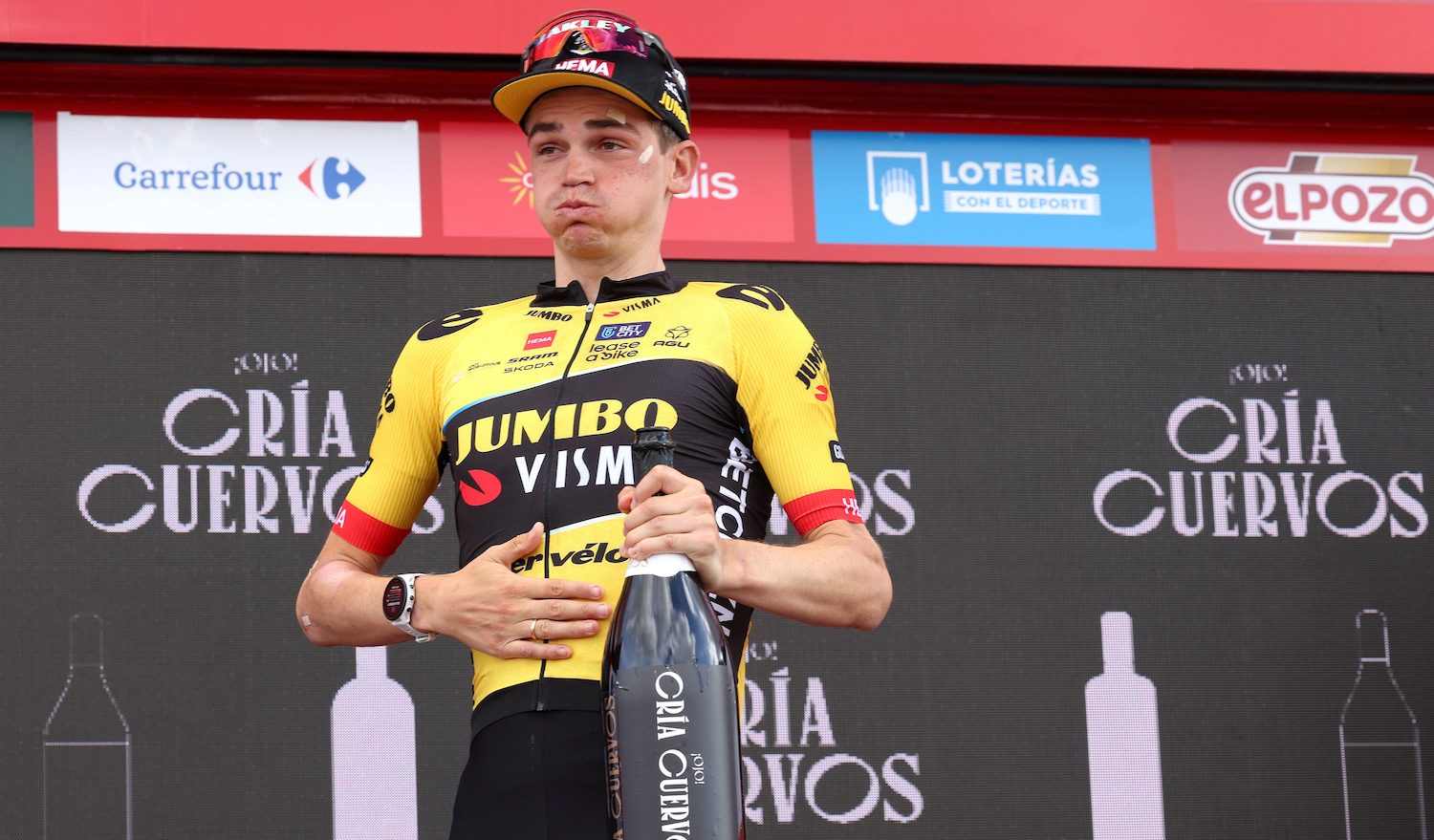You could tell Sepp Kuss had ridden himself into uncharted territory by the way he celebrated. At the tail end of Stage 6 of the Vuelta a España, the 28-year-old Colorado native showcased some slick racecraft by attacking his breakmates at exactly the right moment, then powering away on the steepest part of the Javalambre for a spectacular stage win. When he ascended to the winner's podium, he celebrated like a rider who knew he might not be back up there, quaffing a hilarious amount of his celebratory champagne and burping like a fool.
🇺🇸Sepp Kuss, you legend! 🍾😂 #LaVuelta23 pic.twitter.com/Kd8yvzWv6J
— NBC Sports Cycling (@NBCSCycling) August 31, 2023
The thing is, he might have to learn how to act. Kuss is riding deep into the unknown, and as the spiky, adversarial second half of the Vuelta looms over a tired peloton, it's Kuss who's held onto the red leader's jersey for four stages now. It's Kuss who has shown race-winning form and preternatural calm in the mountains. This is not what anyone expected. Kuss's Jumbo-Visma superteam already won the Giro d'Italia and the Tour de France this season with Primoz Roglic and Jonas Vingegaard, respectively, and they brought both leaders to Spain to try for the triple crown. But when Kuss attacked and won from the breakaway on Stage 6, he found himself minutes ahead of both his elite teammates and the rest of the contenders, and as he put forth an unexpectedly flashy showing in the race's lone time trial, Kuss might somehow be in a position to chase a most improbable Grand Tour win.
The improbability of it all has less to do with Kuss's talent and more to do with his status within both his team and the peloton. When Roglic won the Giro and Vingegaard won the Tour, they both had Kuss to thank, as he turned himself inside out on hard climb after hard climb, chasing down moves and pacing them back up after attacks. After UAE occasionally wobbled Jumbo at the 2022 Tour, it was remarkable to see Kuss controlling the peloton at a higher level this year. There's no better mountain domestique in the sport. You can always see him at the most selective parts of the hardest climbs, leading a reduced group of exhausted contenders. He keeps his head up, looking for attacks, and he always seems to know how to stay at the edge of his limits. And behind his leaders, Kuss has steadily put together a string of quiet, solid finishes at Grand Tours; eighth at the 2021 Vuelta (which he helped Roglic win), 18th at last year's Tour, 14th at this year's Giro, and 12th at this year's Tour, though he only fell out of the top 10 due to a freak accident.
He's never gotten to race for himself, which has always intrigued cycling fans, especially American fans who haven't seen an unrescinded Grand Tour win since Chris Horner's shocking victory at the 2013 Vuelta. How good could Kuss actually be if he were able to truly go for it? It's time to find out. Kuss currently leads the overall classification by 26 seconds, though he has 1:09 on cycling's premier enfant terrible Remco Evenepoel and 1:36 on his teammate Roglic.
The strongest statement of intent and the most promising sign that Kuss might be able to do this thing came during Stage 10's time trial. Kuss has pretty much always treated time trials as soft rest days, so there was no way of knowing exactly how much time he would cede to Evenepoel, the current time trial world champion. "I honestly didn't know what to expect," Kuss said after the time trial. "It was a tough day. I suffered a lot because usually when I do a time trial, I back off when I get too much pain, so it was a new experience." He did not back off when the hurt set in. He gritted through it and finished 13th, just 1:13 behind Evenepoel, who praised his unexpected American rival.
Barring a miraculous recovery from Joao Almeida or Juan Ayuso, or a total collapse from Kuss (who tends to perform very well in third weeks, even if he already has eight weeks of Grand Tour racing in his legs this year), I see only two riders with a serious chance of beating Kuss. Evenepoel will come at Kuss with everything he has, and despite how much weaker his team is, he's already shown in this race that he's capable of outgunning tactically superior teams. The Belgian is exactly the sort of explosive, daring rider who can shake someone like Kuss, who will set a steady tempo and mostly hold off on anything too incendiary unless he has a very good reason to let it rip. But all Kuss has to do now is survive, and he will have Roglic and Vingegaard, who owe their individual successes in part to Kuss, to help him. Roglic is the other prime contender to beat Kuss, though after the time trial, Kuss started talking about how he wants to win and the team's strategy seemed to settle itself: Kuss will be allowed to race Evenepoel, but if he cracks, it's Roglic's race.
This leaves us with a fascinating dynamic heading into the high mountains, where Kuss has tended to flourish. Someone who's never even had the chance to test himself before, against the defending champion, perhaps with the support of two superstars, though with a slim margin between leadership and a brutal reassertion of Roglic's authority. It's hard to call this an underdog story, as Jumbo is the best team in the pro peloton by a serious margin, though it's thrilling to see Kuss finally get to take a real crack at a Grand Tour.






